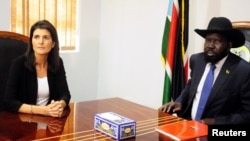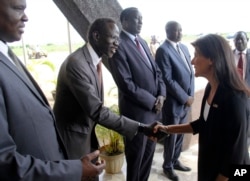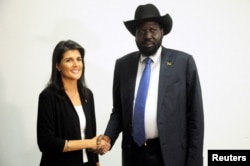U.S. Ambassador to the United Nations Nikki Haley issued a stern warning Wednesday to South Sudan's president, telling him "the hate and the violence that we are seeing has to stop" or the U.S. will reconsider its financial support for the country.
"It was a very honest conversation. I basically said the United States had invested well over $11 billion in South Sudan and into him, and that we were now questioning that investment. I told them that he couldn't deny the stories about his military," Haley said to reporters after meeting with President Salva Kiir.
This was an about-face from Tuesday in Addis Ababa, when Haley sounded hesitant to withdraw U.S. aid from South Sudan despite human rights abuses and the ongoing fighting.
"When you look at South Sudan, you have to really think hard before you pull U.S. aid, because President Kiir doesn't care if we pull U.S. aid. He doesn't care if his people suffer," Haley said.
'The president of everyone'
She said the U.S. had lost trust and that the only way to regain that trust was by taking care of all South Sudanese, adding, "President Kiir is the president of everyone, not just one tribe, not just one group."
South Sudan is the world's youngest country, having gained independence from Sudan in 2011. But despite high hopes and significant international support, the sub-Saharan African nation has been embroiled in a violent civil conflict for nearly its entire existence.
For several years, soldiers loyal to Kiir have clashed with forces loyal to his ousted vice president, Riek Machar, displacing millions of civilians. The two groups are largely split along ethnic lines.
That split became obvious during the U.S. envoy's visit Wednesday.
Meeting cut short
While Haley was meeting with civilians affected by the South Sudan conflict at a U.N. camp in Juba, her trip was cut short after hundreds of people began protesting Kiir's arrival at the camp.
Her security team determined the situation was unsafe and escorted her away.
"The situation just got a little out of hand, and our security colleagues decided it was better to be safe and depart a little early," a spokesman told The Associated Press.
Haley said the Trump administration was closely monitoring events in South Sudan.
Haley said she made it clear to Kiir that the U.S. had to see a willingness "of the government and the military to stop the violence and stop the abuses that are happening in this country."
Talks seen as productive
Kiir's foreign affairs adviser, Nhial Deng Nhial, said the two leaders had fruitful discussions about revitalizing a peace deal put forward by the Intergovernmental Authority on Development (IGAD), an eight-nation regional body, and humanitarian access.
"The discussions revolved around three main terms: the revitalization process of IGAD, the issue of the permanent cease-fire or cessation of hostilities, and issues of humanitarian access," Nhail told South Sudan in Focus.
Nhial said Kiir urged the U.S. government to do more to improve relations between Juba and Khartoum, Sudan's capital, including provision of help in sorting out the final status of the disputed Abyei region, which he described as "complicated."
In addition to visiting South Sudan, Haley also visited Ethiopia, and she will be in the Democratic Republic of the Congo on Thursday.







